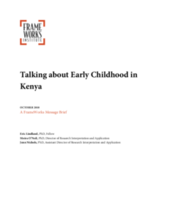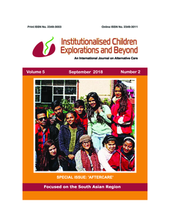Displaying 191 - 200 of 496
This qualitative study examines the academic pathways of 33 college students with a history or foster care placement, homelessness, or both, to better understand the ways in which forms of social capital influence the transition to college and early college experiences in the US.
This report aims to deepen knowledge about children’s early development among members of the Kenyan public and those who work in the early childhood development (ECD) field.
This study explored whether patterns of catch-up growth affect metabolic and cardiovascular outcomes in previously institutionalized adolescents in Romania.
It has long been recognized that early adversity represents a strong risk factor for the development of later psychopathology.
The aim of this study was to examine trajectories of latent psychopathology factors—general (P), internalizing (INT), and externalizing (EXT)—among children reared in institutions and to evaluate whether randomization to foster care is associated with reductions in psychopathology from middle childhood through adolescence.
The present study sought to clarify the relation between maltreatment and mental health among youth in foster care by studying both the isolated dimensions of maltreatment and cumulative maltreatment, and to determine whether the effects of maltreatment on mental health operated indirectly through placement instability.
The purpose of this study was to assess changes in self-reported practices and perceptions of child welfare staff involved in a multifaceted, statewide TIC intervention.
This study reviews a series of interrelated studies on the development of children residing in institutions (i.e., orphanages) in the Russian Federation or placed with families in the USA and the Russian Federation.
This 10th issue of the Institutionalised Children Explorations and Beyond (ICEB) journal, released in September 2018, is a Special Focus issue on ‘Aftercare.’
This thesis study aimed to explore what Looked After Children (LAC) value in their friendships in order to understand what support may help them gain the maximum benefits from these relationships.


